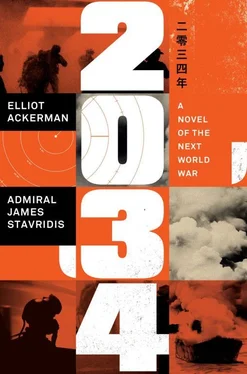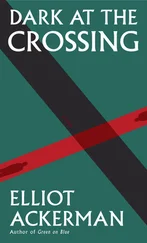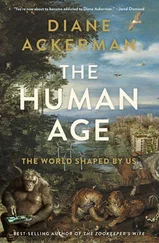Wedge still didn’t say anything. He simply continued on with his stare.
“Right,” said the doctor uncomfortably. “Well, can you at least tell me how you’re feeling today?”
Wedge looked again at the television; panasonic came into focus a bit more quickly this time. He smiled, painfully, and then he turned to the doctor and told him what he resolved would be the only thing he told any of these fucking people: His name. His rank. His service number.

09:42 March 23, 2034 (GMT-4)
Washington, D.C.
He’d done as he’d been told. Chowdhury had gone home. He’d spent the evening with Ashni, just the two of them. He’d made them chicken fingers and french fries, their favorite, and they’d watched an old movie, The Blues Brothers , also their favorite. He read her three Dr. Seuss books, and halfway through the third— The Butter Battle Book— he fell asleep beside her, waking after midnight to stumble down the hall of their duplex to his own bed. When he woke the next morning, he had an email from Wisecarver, subject: Today , text: Take it off.
So he dropped his daughter at school. He came home. He made himself a French press coffee, bacon, eggs, toast. Then he wondered what else he might do. There were still a couple of hours until lunch. He walked to Logan Circle with his tablet and sat on a bench reading his news feed; every bit of coverage—from the international section, to the national section, to the opinion pages and even the arts—it all dealt in one way or another with the crisis of the past ten days. The editorials were contradictory. One cautioned against a phony war, comparing the Wén Rui incident to the Gulf of Tonkin, and warned of opportunistic politicians who now, just as seventy years before, “ would use this crisis as a means to advance ill-advised policy objectives in Southeast Asia .” The next editorial reached even further back in history to express a contradictory view, noting at length the dangers of appeasement: “If the Nazis had been stopped in the Sudetenland, a great bloodletting might have been avoided.” Chowdhury began to skim, coming to, “In the South China Sea the tide of aggression has once again risen upon the free peoples of the world.” He could hardly finish this article, which sustained itself on ever loftier rhetoric in the name of pushing the country toward war.
Chowdhury remembered a classmate of his from graduate school, a Navy lieutenant commander, a prior enlisted sailor who’d gotten his start as a hospital corpsman with the Marines in Iraq. Walking past his cubicle in the study carrels one day, Chowdhury had noticed a vintage postcard of the USS Maine tacked to the partition. When Chowdhury joked that he ought to have a ship that didn’t blow up and sink pinned to his cubicle, the officer replied, “I keep it there for two reasons, Sandy. One is as a reminder that complacency kills—a ship loaded out with fuel and munitions can explode at any time. But, more importantly, I keep it there to remind me that when the Maine blew up in 1898—before social media, before twenty-four-hour news—we had no problem engaging in national hysteria, blaming it on ‘Spanish terrorists,’ which of course led to the Spanish-American War. Fifty years later, after World War Two, when we finally performed a full investigation, you know what they found? The Maine blew up because of an internal explosion—a ruptured boiler or a compromised ammunition storage compartment. The lesson of the Maine —or even Iraq, where I fought—is that you better be goddamn sure you know what’s going on before you start a war.”
Chowdhury closed his newsfeed. It was nearly lunch time. He walked home lost in thought. His desire for de-escalation didn’t stem from any pacifistic tendencies on his part. He believed in the use of force—after all, he worked on the National Security Council staff. His fear of escalation was more instinctual. Inherent in all wars, he knew, was a miscalculation; by their nature it had to exist. That’s because when a war starts both sides believe that they will win.
As he walked, he struggled to put words around his reservations as if he were writing a white paper to himself. His opening sentence came to him. It would be, The America that we believe ourselves to be is no longer the America that we are….
He thought this was a true statement. He pondered just how fraught a statement it was, how an overestimation of American strength could be disastrous. But it was lunch time, and there was nothing he could do about such existential questions, at least at this moment. This crisis, like every other, would likely pass. Cooler heads would prevail because it seemed that they always did.
He rooted around in the fridge. Not much there.
In the background CNN was playing. The anchor announced some breaking news. “We have obtained exclusive video of downed Marine pilot Major Chris Mitchell….”
Chowdhury banged the back of his head as he startled up from the fridge. Before he could get to the television, he heard the warning that the video was graphic, that it might prove disturbing to some audiences. Chowdhury didn’t wait around to see it. He already knew how bad it was. He climbed in his car and rushed to the office, forgetting to turn off the television.
He texted his mother to see if she could pick up Ashni from school, lest he appear negligent to his ex-wife. His mother wrote back immediately and, uncharacteristically, didn’t complain about yet another change in plan. She must have already seen the video, thought Chowdhury. He was listening to the radio on his fifteen-minute drive into work; MSNBC, Fox, NPR, WAMU, even the local hip-hop station WPGC—everyone was talking about what they’d just seen. The image quality was grainy, pixilated, but what they all fixated on was how Wedge—lying on his side, with that brute of an Iranian officer standing over him, kicking him in the ribs and head—kept repeating only his name, rank, and service number.
The divergence of views Chowdhury had read in the paper that morning was quickly yielding to a consensus. Every voice he heard on the drive into work agreed: the defiance displayed by this downed flyer was an example to us all. We wouldn’t be pushed around, not by anyone. Had we forgotten who we were? Had we forgotten the spirit which made us that single, indispensable nation? Chowdhury thought of yesterday’s debate in the Situation Room and the president’s policy of de-escalation. With the release of this video, such a policy would become untenable.
When he barged into his office, the first person he saw was Hendrickson, whom he hadn’t seen since the crisis began. The offices of the national security staff were packed with Pentagon augments who were helping with—or at times getting in the way of—the administration’s response to the Iranians. “When did the video come in?” Chowdhury asked Hendrickson.
He pulled Chowdhury into the corridor. “It came in last night,” he said in a conspiratorial whisper, glancing side to side as though he were about to cross the road. “A signals intercept from Cyber Command—weird that it didn’t come from NSA. It seems this Iranian brigadier in the video lost his cool. He’s well connected and his superiors didn’t quite believe what he’d done until a video circulated internally of the interrogation. We picked it up in their email traffic. Cyber defense has never been a strong suit for the Iranians. They have a tendency to focus on offensive cyber, but kind of forget to guard the barn door.”
“How did it get to the press?” asked Chowdhury.
Читать дальше













